Foundation Stage
The Early Years Foundation Stage (EYFS) applies to children from birth to the end of the Reception year and it describes the curriculum throughout the Nursery and Reception years.
At St. Chad’s, children join Reception class in the September of the academic year that they will turn five. In partnership with parents and carers we enable the children to begin the process of becoming active learners for life.
Early childhood is the foundation on which children build the rest of their lives. At St.Chad’s we greatly value the important role that the Early Years Foundation Stage (EYFS) plays in laying secure foundations for future learning and development.
Learning in the EYFS
Four guiding principles should shape practice in early years settings. These are:
- Every child is a unique child, who is constantly learning and can be resilient, capable, confident and self-assured;
- Children learn to be strong and independent through positive relationships;
- Children learn and develop well in enabling environments, in which their experiences respond to their individual needs and there is a strong partnership between practitioners and parents and/or carers; and
- Children develop and learn in different ways and at different rates. The framework covers the education and care of all children in early years provision, including children with special educational needs and disabilities.
EYFS has its own curriculum and assessment. Children learn best by feeling secure, valued and confident and also through quality play.
The learning experiences we provide are based on our assessment of each child's stage of development and then matched with the Early Years Outcomes and Early Learning Goals (which summarise the knowledge, skills and understanding that all young children should have gained by the end of the Reception year) set out by the Government.
The EYFS Framework explains how and what children will be learning to support their healthy development. Children will be learning skills, acquiring new knowledge and demonstrating their understanding through seven areas of learning and development. Children should mostly develop the three prime areas first. These are:
- Communication and language;
- Physical development; and
- Personal, social and emotional development.
These prime areas are those most essential for children’s healthy development and future learning. As children grow, the prime areas will help them to develop skills in four specific areas. These are:
- Literacy;
- Mathematics;
- Understanding the world; and
- Expressive arts and design.
These seven areas are used to plan children’s learning and activities. Children in the EYFS learn by playing and exploring, being active, and through creative and critical thinking which takes place both indoors and outside.
Throughout EYFS we plan to ensure our youngest children receive high quality learning experiences that build upon existing knowledge, understanding and skills. We aim to ensure children receive rich and stimulating learning opportunities that support learning and development.
At St. Chad’s when we plan and guide children’s activities, we reflect on the different ways in which children learn. Three characteristics of effective teaching and learning are:
- Playing and exploring - children investigate and experience things, and ‘have a go’;
- Active learning - children concentrate and keep on trying if they encounter difficulties, and enjoy achievements; and
- Creating and thinking critically - children have and develop their own ideas, make links between ideas, and develop strategies for doing things.
(Taken from statutory framework for the EYFS 2014)
EYFS Curriculum
Find out what children in our Foundation Stage will be learning through the year:
Religious Education, Spiritual, Moral, Social and Cultural Development
As a Catholic school, our faith is at the heart of all we do. It is embedded in our curriculum and is implicit in all we do. We use the diocesan scheme and assessment procedures.
Throughout our practice and provision our Catholic vision also permeates our curriculum. Throughout our Catholic curriculum children develop a knowledge and understanding of the Catholic faith, gospel values and good citizenship.
As our children grow and learn together in a faith school we aim to nurture and encourage them to become adults who can transform our world into a more just and loving society. Children are encouraged to become caring, responsible and compassionate individuals.
Daily Routine
In Reception the children have between three and five focused learning sessions each day. Parents and children are welcomed at the beginning of each day.
When children are not in a focused learning session they are actively engaged in child initiated learning. During this time children are encouraged to engage in a wide range of high quality learning experiences both indoors and outdoors. Children are encouraged to move around the learning environments independently choosing different activities. Staff support and facilitate children’s learning and development by encouraging children to engage in active learning through purposeful play.
Parents as Partners
We recognise that parents are children’s first and most enduring educators.
At St. Chad’s parents and practitioners work together and the results have a positive impact on children’s development and learning. Positive parental partnerships are crucial for providing the most effective teaching and learning strategies. Equally they are vital for personalising learning opportunities effectively.
We aim to develop positive relationships with parents that enable us to share information about children's interests and learning. This information is used to personalise learning opportunities and provide continuity and progression. We work together and support learning through warm and trusting relationships. The implications of this ensure knowledgeable adults support children’s learning more effectively.
We develop positive parental partnerships that support learning when a child accesses our provision through:
- Talking to parents about their child before their child starts in our school;
- The children have the opportunity to spend time with their teacher and support staff before starting our setting.
- Normally inviting all parents to a stay and play session and a parent meeting.
We continue to build and maintain positive parental relationships through:
- Offering parents regular daily opportunities to talk.
- Encouraging parents to discuss any worries or concerns.
- Parent Workshops
- Involving parents in the curriculum
- Story mornings
- Parent Notice Boards
- Newsletters/Questionnaires
- Parents evenings
Key Person
All staff within the EYFS aim to develop good relationships with all children, interacting positively with them and taking time to listen and value responses and contributions.
At our school all children in the EYFS are assigned a key person. A key person is an important person in a child’s life whilst at school. Their role is to help ensure that every child’s care is tailored to meet their individual needs. This person should help the child become familiar with the setting, offer a settled relationship for the child and build a relationship with their parents.
Parents/carers are encouraged to take the time to build on relationships at any given chance, for example, discussing any important events in the child’s life.
Nursery Documents and Information
The documents below relate to our Nursery provision:
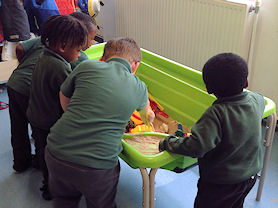 Nursery children enjoy playing in the sand. |
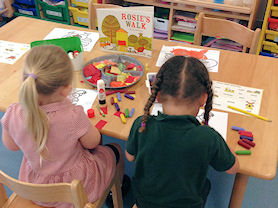 Our youngest children love to draw, colour and be creative. |
|
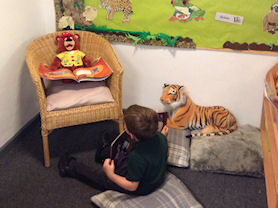 We have a quiet reading area for children to get lost in books. |
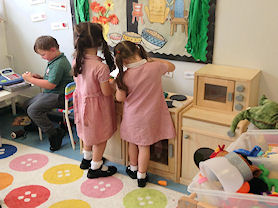 The children enjoy using their imaginations in our popular kitchen and shop. |
|
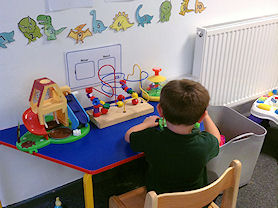 Each day sees different activities to encourage learning through play linked to our weekly topic. |
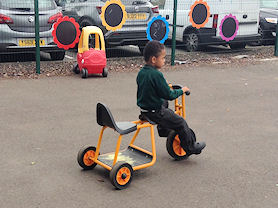 We have a variety of bikes and trikes which the children love to use outside. |